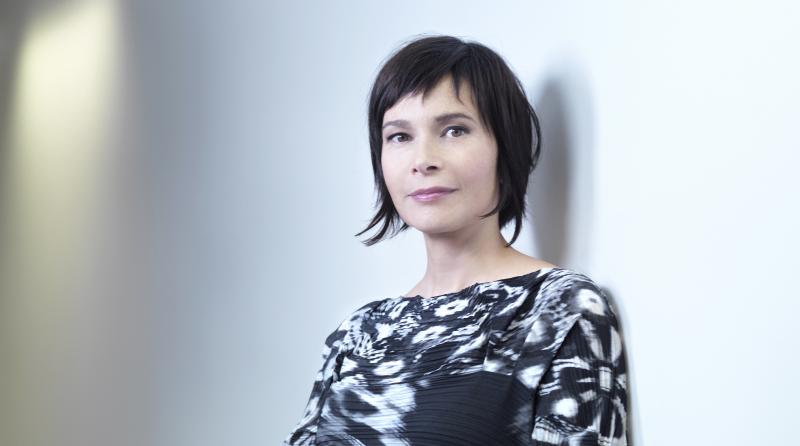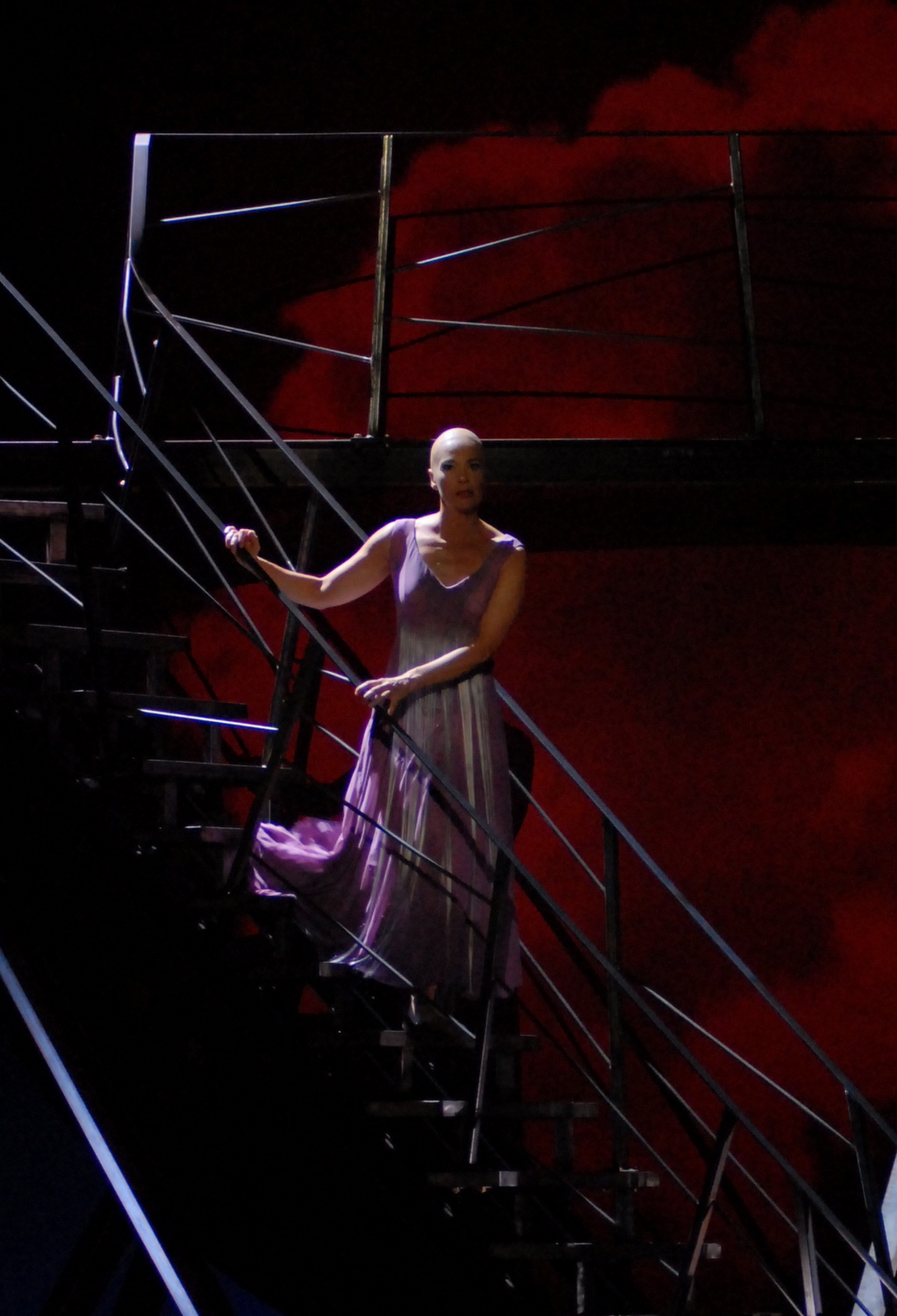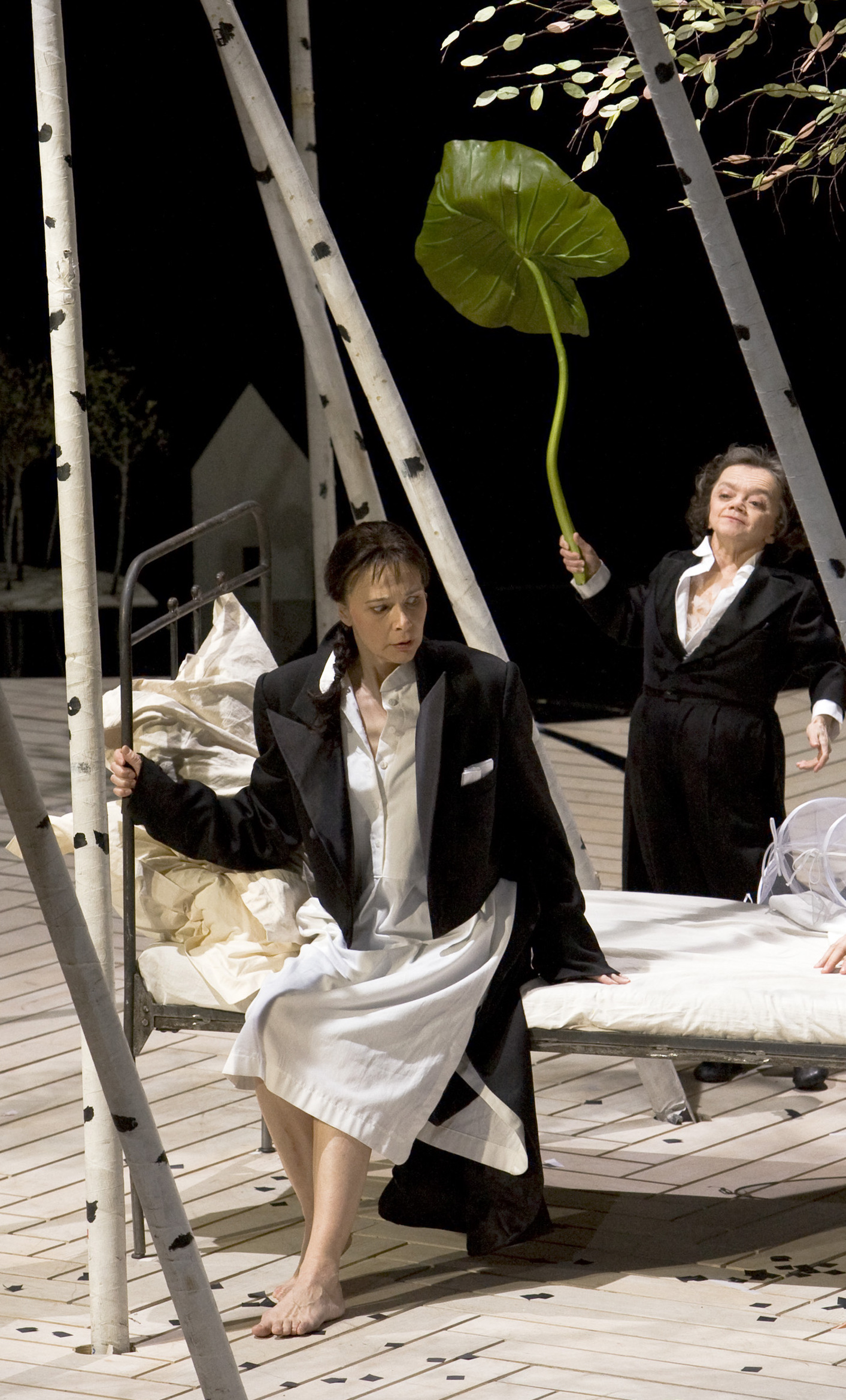10 Questions for Soprano Sandrine Piau | reviews, news & interviews
10 Questions for Soprano Sandrine Piau
10 Questions for Soprano Sandrine Piau
The former harpist who became the connoisseur's soprano of choice for Baroque and early music

French soprano Sandrine Piau, born in 1965 in a south-western suburb of Paris, has an agile, supple voice. It soars, so critics reach readily for all those bird metaphors: nightingale, sparrow, "she leaves the earth on wings of song" and so on.
Away from Baroque repertoire, Piau sings Mozart - a collection for her label Naïve is being released next week. Other roles have incuded Debussy's Mélisande and Britten's Tytania, which she will perform next year in Aix-en-Provence, near to Marseille where she has made her home for the past few years. Sophie in Richard Strauss's Der Rosenkavalier is probably jinxed for her now for ever: two productions earlier in her career when she was booked to sing it were both cancelled. She also gives regular recitals of mélodies and Lieder regularly, notably in partnership with the Paris-based American pianist Susan Manoff.
I witnessed her rehearsing a programme of Rameau and Handel in the dry acoustic of Kings Place's smaller Hall Two, for a concert in Ghent in Belgium, with the Orchestra of the Age of Enlightenment – just the second time she has worked with the OAE – and Christie, who has been important figure in her career. I showed her the empty Hall One. She couldn't resist trying out the acoustics - and definitely approved.
SEBASTIAN SCOTNEY: You were giving massive energy to Rameau in that rehearsal. You seem to really dance with this music, to own it. Is Rameau special for you?
SANDRINE PIAU: For a singer, for everybody, Rameau is like a mountain you have to climb. We have to fight it every time. Probably the reason I move around is because I can't find the energy just from vocal technique. I love this music, but when you have vocalise in Rameau [she demonstrates with a passage in rising fourths] it's like an instrument. Intellectually it's amazing, but physically it's uncomfortable. After many years, yes I'm happy to destroy my voice for Rameau – and also for Charpentier and Couperin!
And Handel?
With Handel, suddenly everything is easy. After three Rameaus you love it, but you say “enough, stop.” After 12 Handels you say “Yes, I'll do that again.” Handel was a composer for divas, for castrati. He knew the voice, he loved the voice. His writing is what we call in French a "caresse". Sometimes you have to work hard, the vocalising, but it's really written for the voice.
It was with Christophe Rousset - whom I first got to know when he was William Christie's harpsichordist in Les Arts Florissants - that I did my very first Handel. A critic said that "with Handel she had really found her way/ voice" (it's a French thing. "Elle a trouvé sa voie/voix"). It was through Christophe that at last I could escape from French music. Handel and Mozart are better for my voice. You should really have the medium/low voice for French music, something like Veronique Gens has. In Handel I can show the high notes, the vocalise, and the emotion too. For me Cleopatra in Giulio Cesare is one of the best parts. I don't have the equivalent in French music, the good parts are more for dramatic voice, but there are single songs that work well- like “Je Vole Amour” from Les Paladins.
William Christie has been an important figure in your career.
I met William Christie when I was at the Paris Conservatoire. I was studying harp. It was the time that the composer Alain Louvier was the Director of the Conservatoire, so my world was the harp, and playing a lot of contemporary music. I took William Christie's class “Interprétation de La Musique Vocale Ancienne” and he was the first to tell me: “If you leave the harp behind, you will be a singer with me.” I really hesitated, I'd been playing the harp, and seriously, for years.
But you'd always been in choirs?
Yes, I was a member of the French radio choir, the Maîtrise de Radio France, as a child from age 10 to 12. A fabulous experience. When I was at the Conservatoire, I was singing in a choir with Philippe Herreweghe to earn some money – it's easier to earn than with a harp, unless you're in an orchestra. The choir was good, and it was good to be with people too. Herreweghe had two choirs, the Collegium Vocale in Ghent and the Chapelle Royale in Paris which was more modern in its vocal style. Sometimes both choirs were together on projects, I enjoyed that. When I did the audition for Herreweghe my dream was to sing Bach with him. The tradition of singing Bach in France is not so strong. That's what I wanted. But he told me, “Your voice is too romantic.” So I sang Bruckner, Reger and Mendessohn for him, as a mezzo. No Bach. Then one day he discovered that I had more high notes than any other soprano in the choir. So I switched from mezzo to soprano. I still couldn't sing Bach with him. I sang Bach, later, as a soloist.
You have been quoted saying you had spectacular arguments with William Christie?
It was really “Ksh!”, you know [she makes a gesture of fists meeting]. It was like Taylor and Burton in Who's Afraid of Virginia Woolf. We did have fights, but I was young. We had one in Salzburg. I was gone. Straight off the stage. He could be very [snorting noise implying a tricky character]. But I was like that too! In truth I'm really a docile person – if you ask me gently. I can do everything. I will try, anything I'm asked to do musically, but I need a "please", I need a "thank you". Sometimes people forget that.
 But that's all behind us now, he's lovely now, we have a nice relationship. There was a big break where we didn't work together for seven years, maybe 10. I was engaged by the Chatelet for a production. I asked them who the conductor was. They told me William Christie, and that they didn't have a problem. I told them, it's been years, and wow, last time we had this big, big row. I said it could be MY problem - or it could be HIS problem. I called Bill, after 10 years. I told him that personally I would be extremely happy to work again with him. "What do you think?" He was immediately fine. He's up and down, he's alive in the emotions, but he's really not the kind of man to bear grudges, it's not in his nature.
But that's all behind us now, he's lovely now, we have a nice relationship. There was a big break where we didn't work together for seven years, maybe 10. I was engaged by the Chatelet for a production. I asked them who the conductor was. They told me William Christie, and that they didn't have a problem. I told them, it's been years, and wow, last time we had this big, big row. I said it could be MY problem - or it could be HIS problem. I called Bill, after 10 years. I told him that personally I would be extremely happy to work again with him. "What do you think?" He was immediately fine. He's up and down, he's alive in the emotions, but he's really not the kind of man to bear grudges, it's not in his nature.
And you've worked with everyone who is anyone in baroque music!
Twenty years ago it was just like a big family. You sang with one conductor, another would come to the concert and just say, “I engage you.” Once I had a concert with Christophe Rousset, in a small village, I don't remember, in Mareuil, somewhere deep in the countryside anyway. Gustav Leonhardt was there, he'd just come to listen. After that I did a project with him. It was something different from the bigger opera world. Labels too, that was a family. You could work with everyone without an agency behind you. It was really like that.
And another activity is song recitals?
I have done two recordings with Susan Manoff, and we work together all the time. We will do one next year, the plan is to do Schubert and Wolf. We both had the dream to do the Sieben Frühe Lieder of Berg. I did them in concert once in Munich with an orchestra. I know it's low but with piano you can do what you want. I love Schoenberg and Berg. I even dreamed of Lulu, but I'm afraid, I don't have a strong enough voice.
Opera roles – what have been the constants, what are the dreams, where would you like your career to go?
I'm lucky in the roles I get. I'm not living with the roles I could do, more with the roles I'm doing. Except Anne Trulove in The Rake's Progress. But who is going to ask a French baroque soprano with English "comme une vache'" [laughs] to do that? I've been lucky for more than 20 years, working with people I like, having the choice to accept or not to accept. That is a luxury, I'm free with the projects I choose, I'm just happy to do what I'm doing.
 The next opera project is something exciting. It's in La Monnaie in Brussels. Alcina, the title role. I've done already Morgana at the Palais Garnier in Paris. This will be with Rousset and Pierre Audi. I have a real relationship with La Monnaie, and its Director Peter de Caluwe. It is the theatre where I did Sandrina in Mozart's La Finta Giardiniera (picture left by Bernd Uhlig for La Monnaie), I did Pamina in The Magic Flute, my first Cleopatra, my first Mélisande (picture above by Maarten van den Abeele for La Monnaie) although I had a nightmare, I got injured on the first run. It took a long time before the hospital picked up what it was, I'd torn a muscle.
The next opera project is something exciting. It's in La Monnaie in Brussels. Alcina, the title role. I've done already Morgana at the Palais Garnier in Paris. This will be with Rousset and Pierre Audi. I have a real relationship with La Monnaie, and its Director Peter de Caluwe. It is the theatre where I did Sandrina in Mozart's La Finta Giardiniera (picture left by Bernd Uhlig for La Monnaie), I did Pamina in The Magic Flute, my first Cleopatra, my first Mélisande (picture above by Maarten van den Abeele for La Monnaie) although I had a nightmare, I got injured on the first run. It took a long time before the hospital picked up what it was, I'd torn a muscle.
After Alcina I will do A Midsummer Night's Dream, Carsen's production, in Aix-en-Provence. It is one of the most beautiful opera productions I have seen in my life. I've said yes every time to that one, it's magical.
And you now live right near Aix, in Marseille?
My husband is originally from Switzerland and he didn't want to live in Paris. You need to escape from Paris but it's hard to do. You have to drive two hours to find... trees. He was living in the mountains near Geneva. So we lived there four years and then I said "no" because snow in May is just not for me. We tried to find a place we could both be happy. I had a dream of living by the sea. We thought Marseille? Nice? We chose Marseille. There's a lot going on. There's the TGV to Paris. And there's swimming in the sea, 26 degrees in September....
You've said that, for a singer, good health doesn't ever go in a straight line. How do you stay in form?
I'm mostly lucky. Some people, I know, are far more careful with me with food and alcohol. I have been ill, yes, but basically I'm strong. I know I have to keep the "souplesse". When I was a child I did proper gymnastics. I'm active, I swim. And, as you saw, I move all the time.
And since you just mentioned eating. Which of the composers whose work you sing would you like to have dinner with?
Handel, somehow, yes, it would have to be Handel. He was a director, he had a theatre, he had responsibilities, like a real, normal man, and at the same time you have this fantastic musical genius who had to manage so many things. Dealing with castrati insisting, "I want that kind of aria." He had to be nice to everybody, but also to get what he wanted in the end, and to do something fantastic for singers. He's definitely the one I would want to meet.
- Rameau 250th anniversary concert with Sandrine Piau at the Wigmore Hall on 1 October
- Sandrine Piau's new Mozart disc with the Salzburg Mozarteum conducted by Ivor Bolton is also released on Monday
Share this article
The future of Arts Journalism
You can stop theartsdesk.com closing!
We urgently need financing to survive. Our fundraising drive has thus far raised £49,000 but we need to reach £100,000 or we will be forced to close. Please contribute here: https://gofund.me/c3f6033d
And if you can forward this information to anyone who might assist, we’d be grateful.

Subscribe to theartsdesk.com
Thank you for continuing to read our work on theartsdesk.com. For unlimited access to every article in its entirety, including our archive of more than 15,000 pieces, we're asking for £5 per month or £40 per year. We feel it's a very good deal, and hope you do too.
To take a subscription now simply click here.
And if you're looking for that extra gift for a friend or family member, why not treat them to a theartsdesk.com gift subscription?

Add comment